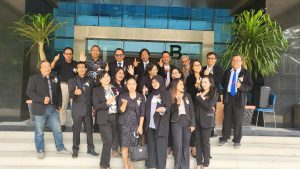
Brief Description of Undergraduate Architecture Study Program
The Department of Architecture (J-ARS) is one of four departments within the FATEK UNSRAT. The J-ARS manages two study programs, namely the PS-ARS and the Urban & Regional Planning Undergraduate Study Program (PS-PWK). Formally, J-ARS has been institutionally present in FATEK UNSRAT since 1998, together with the presence of the Department of Mechanical Engineering and Electrical Engineering, based on the Decree of the Director General of Higher Education No.212 / DIKTI / Kep / 1998, dated 3 July 1998 and Decree of the Director General of Higher Education No. 457 / DIKTI / Kep / 1988 dated 18 December 1998, complementing the existing Civil Engineering Department.
PS-ARS as part of the J-ARS, with reference to the formulation of the vision of FATEK and the vision of UNSRAT has set its own vision for the period 2019-2023, namely "To Become an Architecture Study Program that Receives International Recognition in the ASEAN Region Based on the Vernacular Architecture of the Coastal and Hilly Areas". In the formulation of this vision, the phrase “… Received International Recognition in the ASEAN Region …” is a direct translation of the phrase “…International Class Engineering Faculty…” in FATEK's vision and the phrase “…Excellent University…” in UNSRAT's vision. In the future, as an institution providing higher education services, PS-ARS is expected to become a highly competitive institution in the ASEAN region, especially in addressing the existence of similar higher education services in the field of architecture. In the PS-ARS vision above, the phrase “… Based on Vernacular Architecture of Coastal and Hilly Areas …” is a direct translation of the phrase “… with Local Characters …” in FATEK's vision and the phrase “…Cultured University…” in UNSRAT's vision. In this translation, there is an implied understanding that PS-ARS has an aspiration to become a higher education service institution capable of producing excellent graduates in the field of architecture with special uniqueness in accordance with local wisdom in areas characterized by coastal and hilly areas. The development of education, research and community service activities will be based on sustainable architectural design efforts compatible with that characters. This is expected to make PS-ARS have competitiveness starting at the regional, national and even international levels, especially in the ASEAN region. The formulation of the PS-ARS vision is structured realistically by taking into account the context of human resources, especially the support of educators (lecturers) with various competency backgrounds.
Based on the formulation of its vision and mission, PS-ARS has established a profile of its graduates which is “the Bachelor of Architecture who has the ability to work independently or in group, based on competence, knowledge and skills in various fields of construction industry related to architectural services that have received international recognition in the ASEAN Region, based on Vernacular Architecture of Coastal and Hilly Areas". The formulation of the graduate profile of this study program is also elaborated by taking into account a number of aspects including inputs from various internal and external stakeholders as well as the latest issues and concerns in the field of architecture and other relevant disciplines. Concretely, the formulation of the graduate profile of this study program is at 4 (four) categories of possible professional roles that graduates can fill in, which are construction industry entrepreneurs (architects, consultants, contractors or developers), construction industry workers, academics and bureaucrats.
The formulation of the graduate profile then becomes the basis for determining the expected learning outcomes (ELO) in the PS-ARS which will eventually become a reference in curriculum development. ELOs formulation is carried out by referring also to a number of references, particularly the National Higher Education Standards (SN-DIKTI), the Indonesian National Qualifications Framework (KKNI) and the competency standards from associations related to the study program, especially the Indonesian Architects Association (IAI) and & the Indonesian Association of Architecture Education (APTARI). The ELOs PS-ARS formula generally includes 14 points which are categorically divided into: 1) Attitude, 2) General Skills, 3) Special Skills / Job Abilities and 4) Knowledge Mastery.
Referring to the ELOs formulation, PS-ARS further operationalizes the curriculum (K-2020) which in general includes 42 courses with a total of 146 credits, which are planned to be fulfilled in 8 semesters. This curriculum consists of 4 National Compulsory Courses with a total of 8 credits (5%); 5 University Compulsory Courses with a total of 12 credits (9%); 1 Faculty Compulsory Course with a total of 2 credits (1%); and 32 Study Program Courses with a total of 124 credits (85%), within this there are 4 Courses with a total of 12 credits that should be chosen by students out of 8 Elective Courses provided, each with 3 credits.
The implementation of teaching and learning activities based on the existing curriculum, as well as research and community service activities as the three pillars of higher education at PS-ARS along with monitoring and evaluation efforts to improve them, are carried out by empowering all available resources .